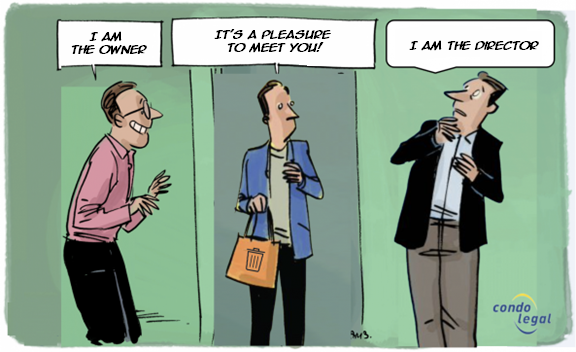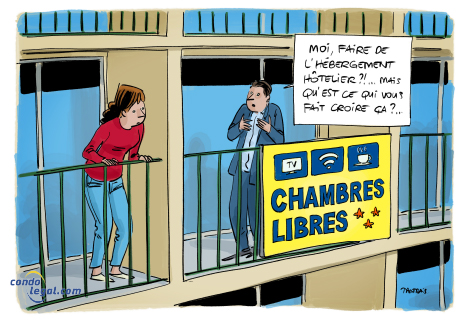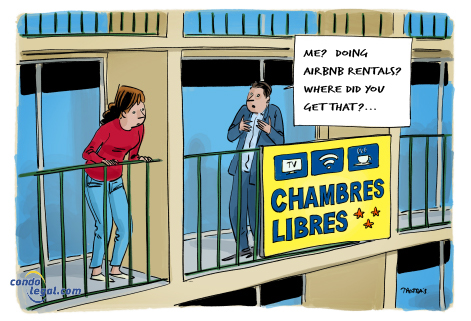 In a co-ownership, some dwellings may be inhabited by the co-owners and others by tenants through a lease contract. Buying to rent is a trend that has emerged for several years in large urban centers as well as resort centers. It is therefore very common for tenants to seek contact with the board of directors or the condo manager (to request the repair of broken equipment, such as the elevator, for example). In the same way, the board of directors or condo manager may wish to communicate with a tenant (if he does not respect the declaration of co-ownership, for example).
In a co-ownership, some dwellings may be inhabited by the co-owners and others by tenants through a lease contract. Buying to rent is a trend that has emerged for several years in large urban centers as well as resort centers. It is therefore very common for tenants to seek contact with the board of directors or the condo manager (to request the repair of broken equipment, such as the elevator, for example). In the same way, the board of directors or condo manager may wish to communicate with a tenant (if he does not respect the declaration of co-ownership, for example).
The rental of a fraction by a co-owner thus implies a tripartite relationship between the syndicate, the landlord and the tenant. But what are the rules?
Duty to notify
In accordance with the Civil Code of Quebec, article 1065 provides that a co-owner who rents his or her unit must, within 15 days, notify the syndicate. He indicates the name of the tenant, the duration of the lease and the date on which he gave him a copy of the by-laws of the immovable. Prior to this rental, the owner wishing to rent his private portion must ensure that the planned rental complies with the rules and limitations recorded therein. Indeed, the declaration of co-ownership may validly contain restrictions on the right to rent a private portion, if these are justified by the notion of destination of the immovable, that is to say, the use to which the immovable is reserved.
Free choice of tenant
The co-owner is free to set up the tenant of his choice, the board of directors has no say. Following a jugment rendered by the Superior Court of Québec, regulations to make the validity of leases granted by a co-owner subject to the prior approval of the board of directors were annulled. It was thus decided that such a restriction directly infringed the ownership right of each co-owner and was not justified by the destination of the immovable.
Tenant and Board of directors
The absence of a contractual link between the tenant and the syndicate means that he is a third party in relation to the co-ownership. In principle, the board of directors is supposed to have a relationship only with the co-owner and the tenant only has a relationship with the co-owner lessor under the lease agreement. When the tenant has a request to make concerning the operation of the co-ownership, he must formulate it to his landlord who will forward it to the syndicate. Thus, in the event that the tenant suffers abnormal neighborhood disturbances, he will have to contact his landlord, who is required, by law, to ensure his lessee, peaceful enjoyment. Conversely, the lease cannot be invoked by the syndicate. The latter will not, for example, be able to sue a tenant for non-payment of common charges owed by the co-owner-lessor.
In the same way, the communication of the syndicate towards the tenant will be deemed to pass through the co-owner landlord. The absence of a contractual link complicates dialogue, but does not make it impossible. In the event of work to be undertaken in the leased private portion, the syndicate must give to the lessee the notices provided for by law in articles 1922 and 1931 of the Civil Code of Quebec. This is the case for emergency work and work necessary for the conservation of the building and decided by the syndicate.
Tenant and building by-laws
The absence of a contractual relationship with the syndicate of co-owners does not exempt the tenant from complying with the provisions of the building by-laws. This enforceability of the by-laws of the immovable against the lessee is expressly provided for by article 1057 of the Civil Code of Quebec, which states:
« 1057. The by-laws of the immovable may be set up against the lessee or occupant of a private portion upon his being given a copy of the by-laws or the amendments to them by the co-owner or, if not by him, by the syndicate. »
This section therefore makes it possible to subject a lessee of an immovable held in divided co-ownership to the same legal rules that the co-owners must respect, with respect to the enjoyment of the inhabited premises, while preserving the tenant's rights not to be opposed to a by-law that he does not know. The copy of the by-laws of the immovable may be given to the tenant by the co-owner, but the syndicate may also do so to prevent the default of one co-owner from affecting the rights of the other co-owners.
The opposability of the building by-laws against the tenant does not release the lessor co-owner from liability. In the event of significant nuisance caused by the tenant (most often, if the latter is too noisy or in the event of neighbourhood disturbances), it is up to the co-owner to act with his tenant to put an end to any disorder reported by the syndicate.
Termination of the lease
Article 1079 of the Civil Code of Quebec provides that "The syndicate may demand the resiliation of the lease of a private portion, after notifying the lessor and the lessee, where the non-performance of an obligation by the lessee causes serious injury to a co-owner or to another occupant of the immovable.” Thus, when a tenant's behavior jeopardizes a project to live in co-ownership, the syndicate is entitled, in the collective interest, to intervene, especially if the landlord may himself be prevented from acting.
It should be noted that article 1855 of the Civil Code of Quebec provides for the general obligation for every lessee, during the term of the lease, to use the leased property with prudence and diligence. In addition, article 1860 of the Civil Code of Quebec specifies that every tenant is required to conduct himself in such a way as not to disturb the normal enjoyment of the other tenants, under penalty of being required towards the landlord and the other tenants to repair the damage that may result from the breach of this obligation, whether this violation is due to his act or to the fact of the persons to whom he allows the use of the property or access to the places.
The criteria for action and the steps to be taken to obtain this termination are similar to the recourse against a co-owner. The only differences are that this action can only be brought by the syndicate, after notifying the landlord and the tenant, who will have the opportunity to correct the situation.
To the extent that the amount of the claim is below the jurisdiction threshold of the Court of Quebec, any application relating to a residential lease must be submitted exclusively to the Tribunal administratif du logement (Administrative Housing Tribunal). It should be noted that a judgment rendered before the Tribunal administratif du logement may result in the termination of a lease, if the seriousness of the tenant's fault is considered sufficient. The syndicate may even, in addition, sue the tenant for compensation for the damage he has caused to the community of co-owners. Remember that to reproach the tenant for non-compliance with the by-laws of the immovable, a copy must have been given to him by the co-owner-lessor. If the latter does not do so, the syndicate will have to do it for him, to be able to act.
WHAT YOU SHOULD KNOW ! Having no legal relationship with the syndicate of co-owners, a tenant has no right to attend the meeting of co-owners, unless he represents an absent co-owner who has given him a power of attorney. However, some decisions made in assembly may have consequences on his daily life, and the tenant will be required to stick to them.
WHAT TO KEEP IN MIND: As he occupies the premises, the tenant is the first to be contacted when a problem occurs in the condominium. However, the board of directors or manager is not required to deal with a tenant, and that is often the response they give when asked. It is therefore up to the co-owner lessor to act as an intermediary.
WARNING ! It is illegal to prohibit a co-owner from renting his apartment. As for the manner in which the right to rent is exercised, the Court of Appeal has already concluded that making this right subject to a maximum percentage of rental in the building ( e.g. the total number of apartments leased must not exceed 10%) constitutes, in this case, a change in the destination of the building.






